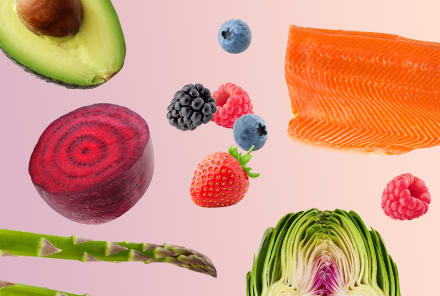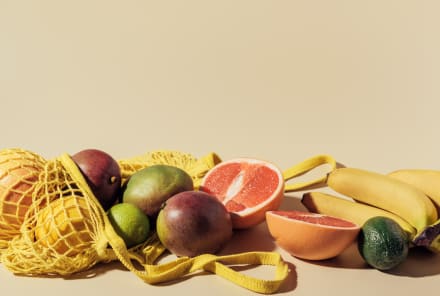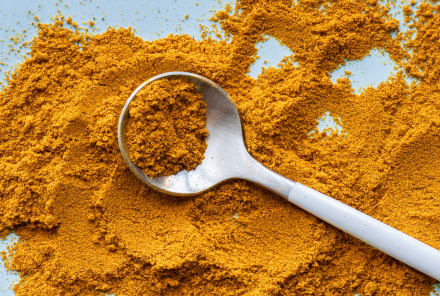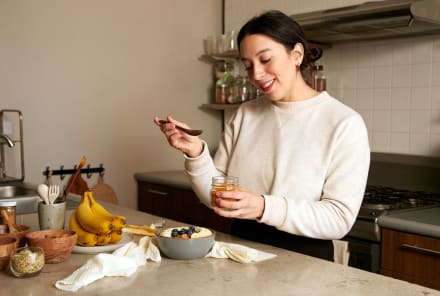Advertisement
The 5 Best Blood Sugar–Balancing Breakfasts To Avoid Hanger All Day Long

Early into my first hospital job, I used to wait to eat breakfast until after morning rounds. Um, yeah, that was a bad idea. Even when I tried to have a snack like a piece of fruit beforehand, I found myself feeling irritable and impatient, ravenous and unable to really concentrate on what other team members were saying—not conducive to a productive day.
In retrospect it’s silly, but I remember feeling pressured to hold out because that’s what I saw my new coworkers doing, but as a morning exerciser who doesn’t function well without a solid breakfast, I got over that pretty quickly. It took about a month of white-knuckling it to realize waiting to eat until 9 a.m. — four hours after I'd woken up — was just not going to work. Besides, who wants to be the ragey new girl?
Instead, I started eating before rounds so that by the time I got there, I was focused, energized, and ready to start seeing patients after the meeting. It was a total game-changer. Even now that I no longer work in a hospital setting, a balanced breakfast is a must.
The reason a balanced morning meal is so important is because it supports stable blood sugar, which is essential to maintaining your energy and a positive mood—key to having a productive, enjoyable day with smooth interactions.
Here's a simple explanation to spare you the gray hairs I got in biochemistry class: Consuming protein and fat along with carbohydrates buffers the breakdown of those carbs, slowing digestion so you don’t experience a sharp spike and then crash in blood sugar. Fiber also helps slow the process, which is why foods like berries, whole grains, sweet potatoes, and beans are a better choice compared to more refined carbs like white bread, pastries, and white potatoes.
When helping my clients establish sustainable routines, breakfast is almost always part of the discussion. How are you fueling your morning? How can you make it easy and enjoyable to stay on track with your goals?
A common mistake I see is someone eating a big bowl of oatmeal with banana and drinking a (sugar-sweetened) almond milk latte, then wondering why they’re starving shortly after. Sure, you’re getting plenty of complex carbs and fiber, but almost zero fat or protein to balance out the meal. Another big one: Gulping down a smoothie with three servings worth of fruit (it can be hard to tell how much is in there when it’s all getting liquified) with sweetened almond milk and maybe a tablespoon of nut butter, which isn’t enough to balance out all the carbs in the fruit and sugar in the almond milk, so they wind up wiped and hangry come 10 a.m.
The good news is that there are lots of delicious ways to balance your blood sugar in the morning. Here are my top five blood sugar–balancing breakfasts.
1. Avocado & Egg Over Greens
I relied on this one a lot when I had a networking meeting that met at 6:45 a.m. every Wednesday. Even for an early riser, I found it a struggle to get my energy up later in the day — until I started bringing this for breakfast. I’d often add a small orange or side of berries to round it out.
Why it works: You’re getting a powerful combination of protein, fat, and fiber, plus some complex carbs and brain-boosting antioxidants in the fruit. It's really versatile because you can enjoy with cooked greens (awesome if you have leftovers) or over raw greens for more of a breakfast salad. If you're making this at home, fried or scrambled eggs are great, and poached are perfect if you enjoy that runny yolk (easy hack: you can even poach eggs in the microwave). Taking your breakfast to go? Do hard-boiled eggs.
2. Oatmeal With Egg Cooked In
I brought a variation on this almost every day for breakfast when I worked in clinical. The oats provided those good carbs, and I’d also cook in chia seeds or ground flax for added fiber and plant-based omega-3s. An egg whisked in during cooking contributes protein, fat, and important nutrients like choline1 and vitamin D2, which are key for cognitive function. Topping your bowl with a drizzle of nut butter adds more healthy fats and fiber, plus a little extra protein.
Just be mindful of portion sizes. I usually recommend ⅓ cup of rolled oats or 3 tablespoons of steel-cut plus 1 tablespoon of chia or flax, cooked with water and whatever spices you like. If you’ve already got protein from the egg, you can keep the nut butter to a teaspoon or two. Plant-based eaters might want to use a full tablespoon or two, or mix in a plant-based protein powder or a protein-rich non-dairy milk like pea-protein milk instead of water to cook their oats. Here's an easy recipe if you want to try it for yourself.
Even if I wasn’t a dietitian, I’d think oats make a delicious vehicle for veggies. You can sneak them in with this zucchini bread-inspired recipe or enjoy savory oats made with savory spices and with leftover cooked veggies tossed on top along with a little goat cheese or tahini (yes, way).
3. Plant-Powered Smoothie Bowl
A smoothie can totally make a satisfying, stabilizing breakfast. Just make sure to keep portions in check on the fruit and work in some healthy fat and protein. If numbers are helpful, aim for about 2 parts veggies to 1 part fruit. By the way you can use frozen greens if fresh isn’t available or convenient. I do it all the time.
Also, don’t be afraid to get weird with your mix-ins. This may sound crazy, but if you’re a smoothie bowl or nice cream fan, I think you’ll love this: frozen riced cauliflower in a smoothie. Seriously. It gives your smoothie a rich, creamy texture and absolutely no funky cauliflower taste, but you still get to reap all those nutritional benefits like fiber, B-vitamins, and potassium.
Here’s my basic recipe. It makes a great blank canvas for add-ins. Sometimes I’ll add in pumpkin puree or cooked kabocha squash. Cocoa powder is also a delicious way to add flavor.
Ingredients
- 1 cup water (or your favorite plant-based milk)
- 1 cup ice
- 1 scoop pea protein powder or your favorite nut butter
- ¼ of a ripe avocado
- ¾ cup frozen riced cauliflower
- 1 cup frozen or 2 cups fresh spinach
- ½ a frozen banana
- ½ cup frozen berries
- For garnish: 1 tablespoon chia seeds or a combo of your favorite seeds, coconut flakes, nuts, and/or cacao nibs
Method
- Add water or plant-based milk, ice, pea-protein powder, avocado, cauliflower, spinach, banana, and berries to a blender and blend until smooth. Pour into a bowl and garnish with chia seeds on top. Enjoy with a spoon.
4. Veggie Omelet
Whether you’re making it from scratch or using leftover cooked vegetables, a colorful omelet is a great way to start your day, thanks to the combination of protein, fat, and fiber. Adding a side of fruit, roasted potato, or whole grain or sweet potato toast provides some complex carbs. If you need a make-ahead option, try a frittata or minis made in muffin cups.
Don’t eat eggs? No problem. A tofu and veggie scramble also makes for a winning breakfast. You’ll still get some healthy fat from the oil used in cooking, and if you’re enjoying yours with whole grain or sweet potato toast, a spread of nut butter or tahini adds some additional staying power. Avocado slices are also delicious on top of a tofu scramble.
5. Yogurt Bowl
Plain low-fat or whole milk Greek or Icelandic yogurt make a great base for a high-protein meal or snack. I love to mix in chia seeds, vanilla extract, and cinnamon and top my bowl with beautiful berries, fresh or frozen—both are great! Want a little something more? Drizzle a teaspoon of nut butter or garnish with cacao nibs, coconut flakes, or your favorite nuts or seeds.
My favorite weird-is-good mix-in is cocoa powder. Aside from enjoying delicious flavor, you’ll get an extra gram or two of fiber and a fluffy texture. Kefir is another great option if you prefer a thinner texture over the thick strained yogurt varieties. It’s also almost completely lactose-free, making it a suitable option if you’re sensitive to dairy. Just go slow with sweeteners—a teaspoon of honey, maple syrup, or jam go a lot further than you might think.
Psst! This one-day diet balances blood sugar and crushes sugar cravings so you never feel hangry again.
Watch Next
Enjoy some of our favorite clips from classes
Enjoy some of our favorite clips from classes
What Is Meditation?
Mindfulness/Spirituality | Light Watkins
Box Breathing
Mindfulness/Spirituality | Gwen Dittmar
What Breathwork Can Address
Mindfulness/Spirituality | Gwen Dittmar
The 8 Limbs of Yoga - What is Asana?
Yoga | Caley Alyssa
Two Standing Postures to Open Up Tight Hips
Yoga | Caley Alyssa
How Plants Can Optimize Athletic Performance
Nutrition | Rich Roll
What to Eat Before a Workout
Nutrition | Rich Roll
How Ayurveda Helps Us Navigate Modern Life
Nutrition | Sahara Rose
Messages About Love & Relationships
Love & Relationships | Esther Perel
Love Languages
Love & Relationships | Esther Perel
What Is Meditation?
Box Breathing
What Breathwork Can Address
The 8 Limbs of Yoga - What is Asana?
Two Standing Postures to Open Up Tight Hips
How Plants Can Optimize Athletic Performance
What to Eat Before a Workout
How Ayurveda Helps Us Navigate Modern Life
Messages About Love & Relationships
Love Languages
Advertisement

A Harvard Study Just Linked 4 Diets To Longevity: Here's What They Are
Gretchen Lidicker, M.S.

A Harvard Study Just Linked 4 Diets To Longevity: Here's What They Are
Gretchen Lidicker, M.S.

A Harvard Study Just Linked 4 Diets To Longevity: Here's What They Are
Gretchen Lidicker, M.S.

A Harvard Study Just Linked 4 Diets To Longevity: Here's What They Are
Gretchen Lidicker, M.S.









